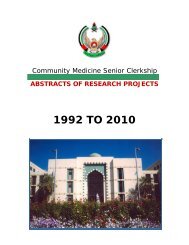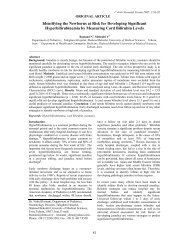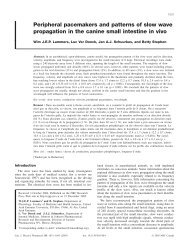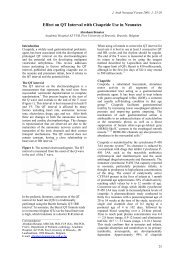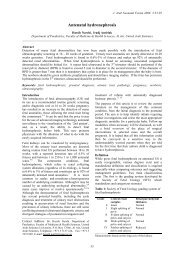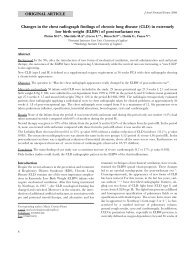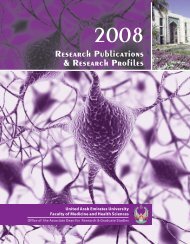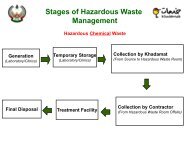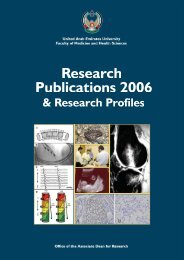Research Publications - College of Medicine and Health Science
Research Publications - College of Medicine and Health Science
Research Publications - College of Medicine and Health Science
Create successful ePaper yourself
Turn your PDF publications into a flip-book with our unique Google optimized e-Paper software.
Department <strong>of</strong> Pharmacology<br />
76<br />
Pharmacogenetics: Oxidation by enzymes encoded<br />
at the CYP2D6 locus is the main route <strong>of</strong><br />
elimination for a large number <strong>of</strong> drugs including<br />
many commonly prescribed in psychiatric<br />
practice such as antidepressants <strong>and</strong> neuroleptics.<br />
The CYP2D6 locus is highly polymorphic<br />
<strong>and</strong> numerous mutant CYP2D6 alleles are<br />
currently known including defective alleles<br />
which yield no functional protein product <strong>and</strong><br />
duplicated active alleles which cause ultrarapid<br />
oxidation. Two CYP2D6 oxidation phenotypes<br />
EM (extensive metabolisers) <strong>and</strong> PM (poor<br />
metabolisers) are commonly recognized. These<br />
phenotypes can be accurately predicted by genotyping.<br />
The clinical implications <strong>of</strong> the CYP2D6<br />
polymorphism are <strong>of</strong> potential importance to<br />
psychiatric practice in the UAE since tricyclic<br />
antidepressants are widely prescribed for treatment<br />
<strong>of</strong> depression. These drugs have a small<br />
therapeutic index <strong>and</strong> unpleasant side-effects<br />
or therapeutic failure is commonly encountered<br />
when fixed dose regimens are used. There are<br />
only very few <strong>and</strong> conflicting data concerning<br />
the distribution <strong>of</strong> CYP2D6 phenotypes in Arab<br />
populations <strong>and</strong> no genotyping studies have<br />
ever been carried out. We aim to determine the<br />
frequency <strong>of</strong> the most common CYP2D6 alleles<br />
in the local population using allele specific PCR<br />
methodology <strong>and</strong> to assess the relevance <strong>of</strong> the<br />
CYP2D6 polymorphism to psychiatric practice in<br />
the UAE (published in PlosOne).<br />
Dr. Samir Attoub<br />
���������������<br />
My research is focused on the role <strong>of</strong> PI3K/Akt/<br />
NFκβ pathway as a driving force behind lung<br />
<strong>and</strong> colon cancer progression (apoptosis, invasion,<br />
angiogenesis <strong>and</strong> metastasis) using siRNA<br />
technology <strong>and</strong> in parallel screening <strong>of</strong> potential<br />
anti-cancer drugs.<br />
1. Identification <strong>of</strong> Akt is<strong>of</strong>orms involved in<br />
colon cancer survival <strong>and</strong> invasion<br />
The PI3K/Akt/NFκB signaling cascade is constitutively<br />
activated in cancers. Akt is linked to<br />
the transforming activity <strong>of</strong> c-src, c-kit, c-met<br />
oncogenes <strong>and</strong> growth factors, such as EGF <strong>and</strong><br />
IGF receptors. Drugs targeting receptor tyrosine<br />
kinases (ErbB2/HER2 <strong>and</strong> ABL/c-kit) impact the<br />
PI3K/Akt pathway. Consequently, the inhibition<br />
<strong>of</strong> Akt is considered to be an attractive cancer<br />
therapeutic target. Three is<strong>of</strong>orms <strong>of</strong> Akt (Akt1/<br />
PKBα, Akt2/PKBβ, <strong>and</strong> Akt3/PKBγ) are over-ex-<br />
pressed <strong>and</strong> activated in cancers, but the degree<br />
<strong>of</strong> functional redundancy between them on<br />
cancer cell survival <strong>and</strong> invasion are unclear. The<br />
identification <strong>of</strong> the Akt is<strong>of</strong>orm that is the most<br />
promising target for cancer therapy is unknown<br />
<strong>and</strong> will be addressed in the following specific<br />
objectives:<br />
a. To explore the respective roles <strong>of</strong> Akt-1, -2<br />
<strong>and</strong> -3 in cancer cell survival, invasion, tumor<br />
growth <strong>and</strong> metastasis, studies will be conducted<br />
using RNA interference technology in LNM35<br />
human lung cancer cells <strong>and</strong> HT29 human colon<br />
cancer cells.<br />
b. To characterize the ability <strong>of</strong> different is<strong>of</strong>orms<br />
<strong>of</strong> Akt (Akt-1, -2 <strong>and</strong> -3) to transactivate<br />
different subsets <strong>of</strong> target genes to orchestrate<br />
either cell survival or invasion. This will be<br />
investigated in colon <strong>and</strong> lung cancer cells using<br />
microarray analysis.<br />
The effects <strong>of</strong> knockdown <strong>of</strong> Akt-1, -2 or -3 on<br />
cellular survival will be determined by cellular<br />
viability, DNA fragmentation, cell cycle <strong>and</strong><br />
TUNEL assays, caspases activity, PARP cleavage,<br />
cytochrome-c release <strong>and</strong> expression <strong>of</strong><br />
pro- <strong>and</strong> anti- apoptotic proteins. The impact<br />
<strong>of</strong> Akt-1, -2 or -3 silencing on invasion will be<br />
investigated using the collagen type I <strong>and</strong> the<br />
chick heart invasion assays, cell-cell <strong>and</strong> cell-matrix<br />
adhesion <strong>and</strong> expression <strong>of</strong> E-Cadherin. The<br />
effect <strong>of</strong> knock down <strong>of</strong> the Akt’s on HT29 cell<br />
line on tumour growth will be tested in nude<br />
mice. In addition, we will asses the development<br />
<strong>of</strong> new blood vessels (CD31 antibody), the<br />
presence <strong>of</strong> apoptotic cells (caspase 3 activity),<br />
<strong>and</strong> proliferative activity (ki67 antibody). We’ll<br />
test the therapeutic impact <strong>of</strong> the Akt is<strong>of</strong>orms<br />
inhibition on metastasis using the highly<br />
invasive <strong>and</strong> metastatic lung cancer cell line<br />
LNM35 targeting the lymph nodes <strong>and</strong> lungs.<br />
This cell line is stably transfected with a vector<br />
encoding luciferase, to allow a rapid <strong>and</strong> reliable<br />
quantification <strong>of</strong> micro-metastases. To identify<br />
the mechanisms underlying the effects <strong>of</strong> Akt<br />
is<strong>of</strong>orm inhibition, we will search for differentially<br />
expressed genes using microarray analysis<br />
<strong>and</strong> confirm the results by real-time RT-PCR.<br />
It is anticipated that this project will provide<br />
evidence that targeting Akt-1 <strong>and</strong>/or -2 is a<br />
promising strategy for the treatment <strong>of</strong> colon<br />
<strong>and</strong> lung cancer.



